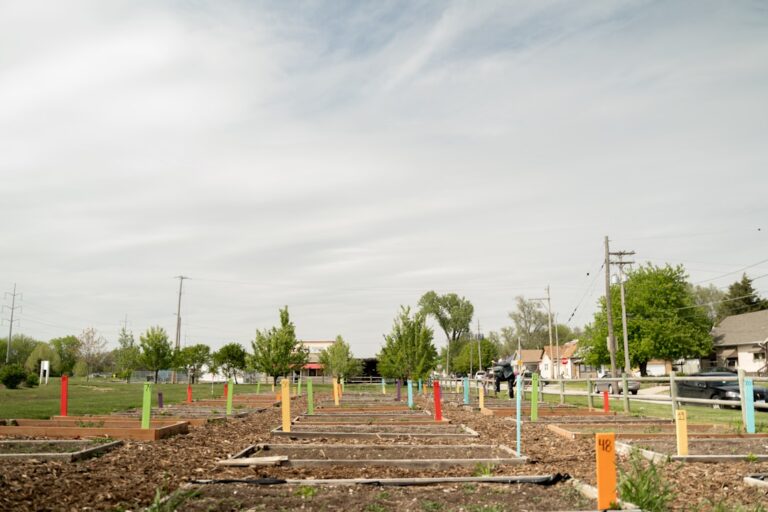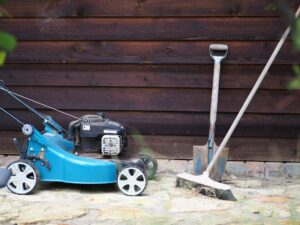Selecting the appropriate grass seed is a critical step in establishing a healthy and vibrant lawn. The right seed not only influences the aesthetic appeal of your yard but also determines how well the grass will thrive in your specific environment. Different grass species have unique characteristics, such as growth habits, drought resistance, and shade tolerance, which can significantly impact their performance.
For instance, cool-season grasses like Kentucky bluegrass and fescue are ideal for northern climates, where temperatures are cooler, while warm-season grasses such as Bermuda and zoysia flourish in southern regions with higher temperatures. Moreover, the choice of grass seed can affect maintenance requirements. Some grass types require more frequent mowing, watering, and fertilization than others.
By selecting a variety that aligns with your lifestyle and maintenance preferences, you can create a lawn that not only looks good but also fits seamlessly into your routine. Additionally, understanding the importance of seed quality is paramount; high-quality seeds are more likely to germinate successfully and resist pests and diseases, leading to a more resilient lawn over time.
Key Takeaways
- Choosing the right grass seed is crucial for a healthy and vibrant lawn
- Local garden centers and nurseries are great places to find high-quality grass seed
- Online resources can help you locate reputable grass seed suppliers
- Consider climate and soil conditions when selecting grass seed for optimal growth
- Seek recommendations from local landscapers and lawn care professionals for expert advice
Researching Local Garden Centers and Nurseries
When embarking on the quest for the right grass seed, local garden centers and nurseries serve as invaluable resources. These establishments often carry a curated selection of grass seeds that are well-suited to the regional climate and soil conditions. Visiting these centers allows you to engage with knowledgeable staff who can provide insights into which varieties perform best in your area.
They can also offer advice on the specific needs of different grass types, such as sunlight requirements and watering schedules. In addition to personal interaction, local garden centers frequently host workshops or informational sessions that can enhance your understanding of lawn care. These events may cover topics such as soil preparation, pest management, and seasonal maintenance tips.
Furthermore, purchasing from local sources supports community businesses and ensures that you are obtaining seeds that are adapted to your local environment, increasing the likelihood of successful germination and growth.
Utilizing Online Resources to Locate Grass Seed Suppliers

In today’s digital age, online resources have become an essential tool for locating grass seed suppliers. Numerous websites specialize in gardening supplies, offering a vast array of grass seed options that may not be available at local stores. These platforms often provide detailed descriptions of each seed variety, including growth habits, ideal planting conditions, and maintenance requirements.
This wealth of information allows you to make informed decisions based on your specific lawn care goals. Additionally, online reviews and ratings can guide you in selecting reputable suppliers. Customer feedback often highlights the quality of the seeds and the reliability of the supplier’s service.
Many online retailers also offer competitive pricing and bulk purchasing options, which can be particularly beneficial for larger projects or extensive lawns. Furthermore, some websites provide educational resources such as blogs or videos that cover best practices for planting and maintaining grass, enhancing your overall knowledge and confidence in lawn care.
Considering Climate and Soil Conditions for Optimal Grass Growth
| Climate and Soil Conditions | Optimal Grass Growth |
|---|---|
| Temperature | Between 60-75°F (15-24°C) |
| Rainfall | 20-30 inches per year |
| Soil pH | 6.0-7.0 |
| Soil Type | Well-draining loam or sandy soil |
| Sunlight | 6-8 hours of direct sunlight per day |
Understanding your local climate and soil conditions is crucial when selecting grass seed. Different regions experience varying temperatures, rainfall patterns, and seasonal changes that can significantly influence grass growth. For example, areas with hot summers and mild winters may benefit from warm-season grasses that thrive in heat, while regions with cold winters may require cool-season varieties that can withstand frost.
Soil conditions also play a pivotal role in determining which grass types will flourish. Conducting a soil test can provide valuable insights into pH levels, nutrient content, and soil texture. For instance, sandy soils drain quickly but may require more frequent watering, while clay soils retain moisture but can become compacted.
By understanding these factors, you can select grass seed that is not only compatible with your climate but also suited to your soil type, ensuring optimal growth and resilience.
Seeking Recommendations from Local Landscapers and Lawn Care Professionals
Local landscapers and lawn care professionals possess a wealth of knowledge about grass seed selection tailored to specific environments. Their hands-on experience with various grass types allows them to provide personalized recommendations based on your lawn’s unique conditions. Engaging with these experts can help you navigate the complexities of grass selection by considering factors such as sun exposure, foot traffic levels, and intended use of the lawn—whether for recreational activities or aesthetic purposes.
Moreover, professionals often have insights into local trends and common challenges faced by homeowners in your area. They may recommend specific seed blends that have proven successful in similar landscapes or advise on maintenance practices that enhance growth and longevity. Establishing a relationship with a local landscaper not only aids in selecting the right grass seed but also opens doors to ongoing support for lawn care throughout the seasons.
Exploring Different Types of Grass Seed Varieties

Grasses for Specific Climates and Conditions
Cool-season grasses, such as tall fescue, are renowned for their adaptability to varying climates and their deep root systems that enhance drought resistance. In contrast, fine fescue varieties excel in shaded areas due to their ability to thrive with limited sunlight.
Warm-Season Grasses for Hot Climates
Warm-season grasses like Bermuda grass are favored for their rapid growth during hot months and their resilience against heat stress. Zoysia grass is another popular choice for southern lawns due to its thick growth habit that withstands wear and tear while providing a lush appearance.
Innovative Hybrid Varieties
Additionally, hybrid varieties have emerged in recent years, combining traits from different species to create grass types that offer enhanced performance characteristics. For example, some hybrids are bred for improved disease resistance or faster establishment rates. Exploring these innovative options can lead to a more robust lawn that meets both aesthetic desires and practical needs.
Comparing Prices and Quality of Grass Seed Products
When it comes to purchasing grass seed, price is often a significant consideration; however, it is essential to balance cost with quality. While cheaper seeds may seem appealing initially, they often come with lower germination rates or inferior growth characteristics. Investing in high-quality seeds may result in a more vibrant lawn that requires less maintenance over time.
To make informed comparisons, examine the packaging for information on seed purity and germination rates. Reputable brands typically provide this data, allowing you to assess the quality of their products. Additionally, consider purchasing from suppliers who offer guarantees or warranties on their seeds; this can provide peace of mind regarding your investment.
Furthermore, bulk purchasing options can lead to cost savings for larger projects or extensive lawns. Many suppliers offer discounts for buying in larger quantities, making it more economical to invest in high-quality seeds without breaking the bank. By carefully comparing prices while prioritizing quality, you can achieve a lush lawn that enhances your property’s value.
Tips for Properly Planting and Maintaining a Lush Lawn with Grass Seed
Successfully establishing a lush lawn from grass seed requires careful planning and execution during both planting and maintenance phases. Begin by preparing the soil adequately; this involves removing debris, rocks, and weeds while loosening the top layer of soil to promote good seed-to-soil contact. Aerating the soil can also enhance drainage and root penetration, setting the stage for healthy growth.
When it comes to planting, follow the recommended seeding rates for your chosen variety to avoid overcrowding or sparse patches. Lightly raking the soil after sowing helps ensure good coverage while protecting seeds from birds or wind displacement. Watering is crucial during this stage; keep the soil consistently moist until germination occurs, which typically takes one to three weeks depending on the grass type.
Once established, maintaining your lawn involves regular mowing at the appropriate height for your chosen grass type—this encourages denser growth while preventing weeds from taking hold. Fertilization should be timed according to seasonal needs; cool-season grasses benefit from fertilization in early spring and fall, while warm-season grasses thrive with summer applications.
Implementing these practices will not only help you achieve a lush lawn but also foster long-term health and resilience against environmental stresses.
If you are looking for information on grass seed near you, you may also be interested in understanding analytic functions, Cauchy-Riemann equations, and harmonic functions. This article provides a comprehensive guide to these mathematical concepts and their applications. You can learn more about it here.
FAQs
What is grass seed?
Grass seed is the seed of a grass plant that is used for planting and growing new grass in lawns, fields, or other areas.
Where can I find grass seed near me?
You can find grass seed at local garden centers, nurseries, home improvement stores, and agricultural supply stores. You can also search online for suppliers in your area.
What types of grass seed are available?
There are several types of grass seed available, including cool-season grasses like Kentucky bluegrass and fescue, warm-season grasses like Bermuda grass and Zoysia grass, and blends of different grass species for specific purposes.
How do I choose the right grass seed for my area?
It’s important to consider your climate, soil type, and the amount of sunlight your lawn receives when choosing grass seed. You can also consult with a local gardening expert or extension service for recommendations.
What are the best practices for planting grass seed?
To plant grass seed, prepare the soil by removing debris and loosening the top layer. Spread the seed evenly, then lightly rake it into the soil. Water the area regularly to keep the soil moist until the grass seed germinates and establishes.
When is the best time to plant grass seed?
The best time to plant grass seed depends on the type of grass and your climate. In general, cool-season grasses are best planted in early fall or early spring, while warm-season grasses are best planted in late spring or early summer.
























+ There are no comments
Add yours